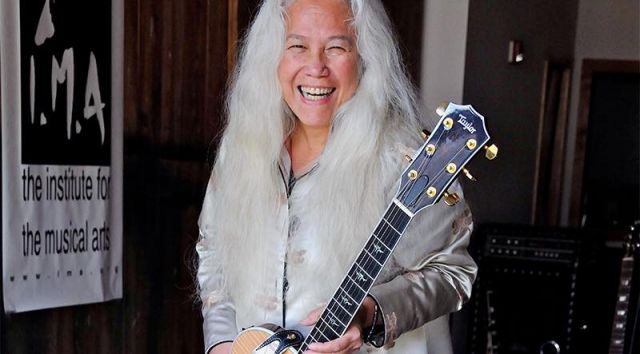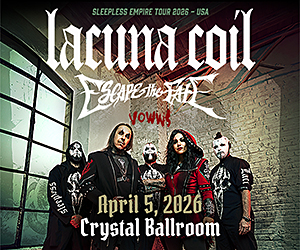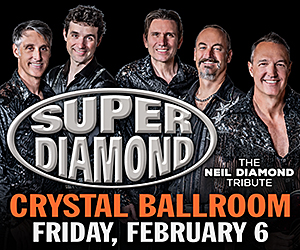Home > Rock
01/01/2021
Fanny Celebrates Fifty: Q&A with June Millington / OMN Best-of 2020
By ANA AMMANN // Before the Go-Go's or Sleater-Kinney, Fanny was the first all-female band to release an album on a major label. We checked in with band founder, June Millington, on the 50th anniversary of their debut album.
Among the few positives that happened in 2020, OMN's Publisher Ana Ammann talked to June Millington of Fanny who "paved the way for generations of female rockers." First published on September 13, 2020.
- - - - - - - - - - - - - - - - - - -
Before the Go-Go’s, the Runaways, Bikini Kill and Sleater-Kinney, Fanny was the first all-female band to write their own songs, perform their own instruments and release an album on a major label (Reprise).
Led by Philippine-born sisters June (guitar) and Jean Millington (bass), the original lineup also featured Nickey Barclay (keyboards) and Alice de Buhr (drums) – each member contributing to vocals. The band released a string of popular albums in the early 1970’s and toured the world with bands like the Kinks, Sly and the Family Stone, Chicago, Chuck Berry, Dr. John, The Staples Singers, and Jethro Tull.
The band dissolved in 1973 after four albums with Reprise, but not before paving the way for generations of female rockers to come. David Bowie once said of them in a 1999 Rolling Stone interview, “They were one of the finest fucking rock bands of their time. They were extraordinary: They wrote everything, they played like motherfuckers, they were just colossal and wonderful, and nobody’s ever mentioned them. They’re as important as anybody else who’s ever been, ever…”
This summer, their self-titled album celebrated its 50th anniversary with a sold-out reissue by Real Gone Music. We checked in with June Millington to ask about some of the history she shares in her memoir, as well as her current projects and plans.
* * *
It’s been 50 years since the release of Fanny’s self-titled debut album. In your view, what has changed for women in the music industry, and what has stayed the same?
As far as I can tell, there are so many more girl and women musicians that it's almost the norm. So many women to look up to, so many over-the-top technicians on every instrument; I have to say for me that's totally awesome. It's almost an embarrassment of riches! Some of the girls presented on the net are so young ... I do wonder if they've had any chance to find their voices. But they're doing it and looks like they're having fun.
What has remained the same? The same derogatory comments, the mindless need for "the skimpier the outfits the better" attitude from both the public and industry moguls, and just the overall lack of respect. That really bugs me. Women have not been released from that box yet, and it makes me wonder if they ever will. The societal pressure is so great!
Let’s go back in time. In your memoir, ‘Land of a Thousand Bridges: Island Girl in a Rock & Roll World,’ you share stories about being the eldest of seven children in post-WWII Philippines with a Filipino mother and American naval officer father. How did music help you integrate when you immigrated to Sacramento with your family as a teenager?
Music allowed us to make friends and reach right into people with no barrier at all. Plus, if you were in a dance band playing Top 40 hits, and you made it work and you were all girls – it was a magnificent 1-2 punch!
Watch: Fanny perform “Charity Ball” on Sonny & Cher
The book gives readers an insider’s view of what it was like to live in 1970’s Hollywood at your house “Fanny Hill,” play the very first Sonny & Cher show, be Barbra Streisand’s backing band and record at Abbey Road Studios.
I understand you’ve started work on a follow up, can you share any details about what fans can expect in Volume 2?
Volume 2 starts in 1975, after I had my (spiritual) sabbatical and ended up in Woodstock. In that period, I wrote "So Good to Be Home," "Heaven is in Your Mind," and "Your Own Way." Then life overlapped with Jean and Fanny once again. I got to LA just before Cris Williamson started recording her album The Changer and the Changed.
That album was ground-breaking – it was produced entirely by women and I believe is still considered to be the all-time best-selling album in the women’s music genre.
You cannot imagine. Not only was Cris a fan of mine, but her bass player was my girlfriend, whom I lived with in Long Island, then Woodstock. Jean's hit "Butter Boy" exploded, and Fanny went off on tour. When we got back to LA, Cris asked me to play on Changer. In Spring of '76, I went on the road with Cris - and nothing was ever the same. I'm glad I was there.
To give you some context, "That’s the Way of the World," and that entire Earth Wind and Fire album was a hit at that time. The air was on fire and so were our spirits once everyone realized what was going on with feminism and music combined. It was absolutely incendiary, a time of multiple paradigm shifts. So, when the book opens, I'm trying to explain all that and place you there.
You’ve borne witness to the Civil Rights movement, the anti-Vietnam War movement and the women’s liberation movement. What do you think people will remember about this current period in history?
That is certainly still being lived and written, but it goes back to what we're teaching the girls here: how to have a conversation, how to hold on and strengthen dignity, pass good works on, and always consider others and the good of everyone. They know what's right, they just need to be guided and affirmed in saying it out loud. Shyness works in a Rock 'n Roll Girl's Camp (of course they're all basically shy!), but finding your Light, and stepping into it, with others, that's key.
With Civil Rights, seems like the lessons must be learned anew, so many layers. Right now, we're fighting in solidarity with the Black Lives Matter movement, but Native American rights seem to be continually pushed to the side. Women's rights are a constant struggle, but there's where music and the lessons of truth and dignity come in so "handy." They really work! Our job, as elders, is to continually support that.
Fanny paved the way for female rockers, and for the past 34 years, you and your partner Ann Hackler have inspired and mentored women and girls in music and music-related businesses through your non-profit, The Institute for the Musical Arts (aka Miss Millington’s School for Young Ladies). How do you see music empowering young women today?
There is no way in which music does not empower young women, at any time. But today, 1) it instills confidence; 2) it is highly collaborative, and girls can learn leadership skills - the kind where you are building up others, right alongside with yourself. This is a win-win. Oh, and 3) you realize you are learning another, very powerful language, knowing at the same time that it helps both sides of your brain function more efficiently and work together; and finally, 4) you realize the value of listening and having a conversation. In music, not everyone who speaks can be the loudest all the time. Especially with electric guitar, I teach the girls that they can have a big sound, but simultaneously control the volume. That is a learned skill, you have to notice. Everything they learn is a metaphor for life, or a life skill in itself.
You have written and recorded new, original music throughout the years, do you have any plans for a future release?
Oh, yes, definitely have plans, for songs both new and old. Some are being written now, some will even be recorded next week! It seems that I keep having more and more to say! I even have a podcast Music in our Veins where I talk with friends about the magic of creating and performing music.
Here’s to the next 50 years of Rockrgrrrls!
* * *
To contribute to the development of the next generation of female rockers, please visit Institute of Musical Arts at https://www.ima.org/
Jean Millington is in need of support in her continued recovery from a stroke via GoFundMe, please consider donating at www.gofundme.com/jean-millington-go









Harold Mason
Great article Ana and thanks for sharing!
Great band, great story, true ground breakers!